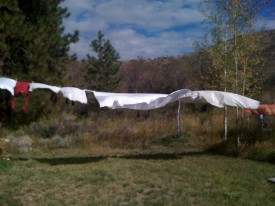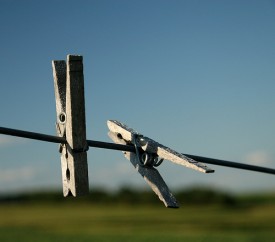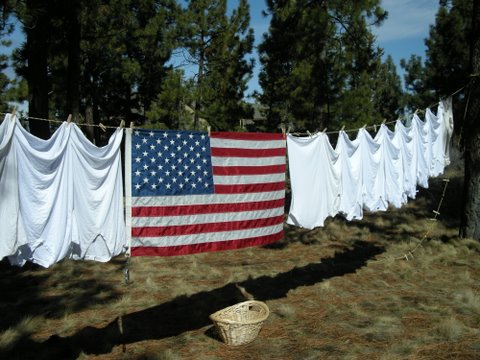Editor’s Note: This post is adapted from Sightline’s recent report: Making Sustainability Legal.
Elizabeth Morris and her family bought their house in the High Point neighborhood for a reason. It’s been touted internationally as Seattle’s premier “green community” and for mixing Seattle Housing Authority rental properties and private home ownership. It’s a compact, walkable, mixed-income, energy-efficient, green-built neighborhood peppered with bicycle commuters and rain barrels. So Morris was shocked to find that at High Point, clotheslines are banned.
“Homeowners have even been warned that it is illegal,” Morris said. “Not only are owners not allowed to save energy by hanging out laundry but those who rent from SHA (read: low income) aren’t allowed to save on their energy bills either.”
Like over 60 million other Americans and Canadians, Morris lives in a neighborhood governed by a homeowners association (HOA). These quasi-private governments, along with some apartment blocks and condominiums, generally feel free to set rules as they see fit. Penalties for violations range from fines to forced expulsion.
Just imagine being banished by your neighbors for drying your clothes!
Clothesline bans are wrongheaded for a number of reasons.

To start, clothes that are hung out to dry last longer. All that lint in the dryer filter has to come from somewhere! Moreover, the Northwest Power and Conservation Council estimates that households in the Northwest states use 4.3 percent of their annual electricity consumption to dry laundry. To put that into perspective, even our refrigerators only gobble up 3.5 percent. As the New York Times highlighted in an article last year, the typical US household could prevent 1,500 pounds of carbon dioxide from entering the atmosphere each year simply by turning off its dryer and hanging out the wash. Oh, and clotheslines never burn down your house; in the US alone, dryers cause more than 12,000 residential fires annually.
Still, for many northwesterners, overbearing homeowner, condo or apartment building rules deny them the choice. The Willow Brook Home Owners Association (HOA) in Bonney Lake, Washington, lumps clotheslines with such outdoor undesirables as “litter, trash, junk… broken or damaged furniture… [and] trash barrels.” In the neighborhood of Awbrey Butte in Bend, Oregon, Susan Taylor, a clothesline-touting mother and nurse, garnered national attention a few years ago, including a spot on the Colbert Report, for standing up to her homeowners association when it fined her nearly $1,000 for sun-drying her laundry without approval. Bans do not have to be explicit to be a significant barrier, either: the neighborhood of Forest Heights in Portland, Oregon, allows clotheslines, but only if they are “completely screened” and “are not visible from any street or adjoining property.”
In an age of climate change, high energy prices, a down economy, and tight budgets, leaders have few clearer opportunities to help citizens save money while trimming emissions than to legalize clotheslines. Fortunately, there’s good news on that front. Six states—Colorado, Florida, Hawaii, Maine, Maryland, and Vermont—have passed laws that explicitly prohibit the banning of clotheslines. In 2008, Ontario became the first Canadian province to pass so-called Right to Dry legislation (though it exempted condos and apartments).
Here in Cascadia, the Oregon legislature has considered, but failed to pass, House Bill 3059, which would amend the rules that govern what can be legally included in property agreements. Bend resident Taylor, who has been fighting with her homeowner association over its clothesline ban and whose own drying cord has been cut by laundry haters, recently discovered something interesting. An obscure 1979 Oregon law may already shield the legality of sunning her wardrobe.
This law appears to have legalized clotheslines on most Oregon properties 33 years ago. The law says that no property contract such as an HOA covenant can restrict a buyers’ use of solar energy systems. Is Taylor’s clothesline a solar energy system? Physics says “yes,” although no appellate court in Oregon has ever ruled on this point. Clotheslines appear to fit under the umbrella of Oregon’s, and other states’, solar rights because systems for hang-drying rely on the sun’s radiation to evaporate water in wet laundry.
In addition to Oregon, the solar access laws in Arizona, California, Illinois, Indiana, Louisiana, Massachusetts, Nevada, New Mexico, North Carolina, Texas, Virginia, and Wisconsin all delineate a homeowner’s right to install a “solar energy system,” “solar energy device,” “solar collector,” “system for obtaining solar energy” or “solar energy collection device.” The legal terminology varies, but the letter and spirit of these laws has one overarching message: homeowners may utilize the power of the sun.
In these states, and the six that have explicitly legalized clotheslines, illegal bans persist in community rulebooks such as HOA Covenants, Conditions, and Restrictions (CC&Rs).
Sightline has compiled the above map of clothesline bans from the input of readers and other sources. The explicit right-to-dry states are those with blue pushpins marking clothesline bans. As of early 2012, of the 220 bans marked on the map, 26 were in states that specifically mention clothesline bans as void. The solar-access-law states are those with yellow pushpins marking bans. Some 103 bans are in these states. The two green pins show bans in Utah, where individual land use authorities may protect the right to dry.
While laws in Delaware and New Jersey allow for roof-mounted solar systems and Washington law overrides bans on solar panels, these states and 27 others have no legal protections for solar energy generally or clotheslines specifically. In these states, marked in red, the right to dry is not yet protected.

Nationwide in the United States, more than a quarter million homeowner associations govern upwards of 60 million people. Alexander Lee, a champion of the right-to-dry movement, estimates that “more than half of them (HOAs) restrict or ban the clothesline.” Therefore, tens of millions of Americans are subject to either full or partial clothesline bans. Some 19 states, including some of the most populous states like California, Florida, and Texas, have right-to-dry laws. These facts combined suggest that millions of Americans live under illegal clothesline bans.
If you live in any of the right-to-dry or right-to-solar-energy states and HOA rules have hampered your drying, take heart. The law may have been on your side all along. Grab your clothespins and laundry basket, string up a line and hang out the wash. If anyone hassles you, point to the relevant statute – and dry on!
This post was combined from articles by Sightline intern Jake Kennon and Sightline volunteer Jon Howland (here and here). All were edited by Alan Durning.


Comments are closed.